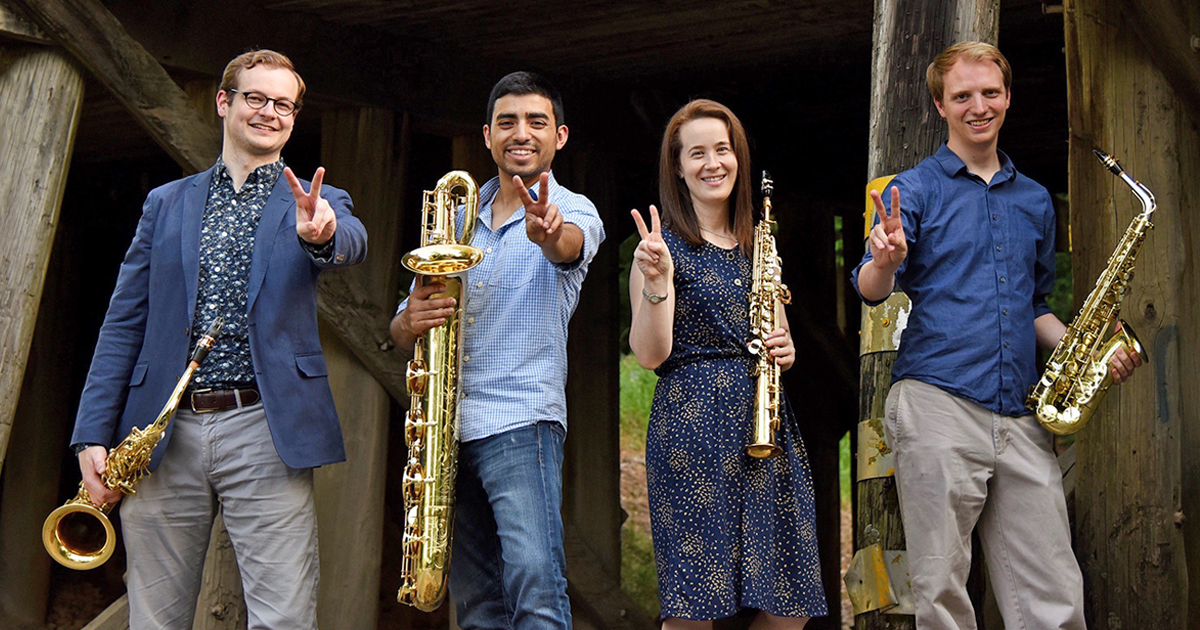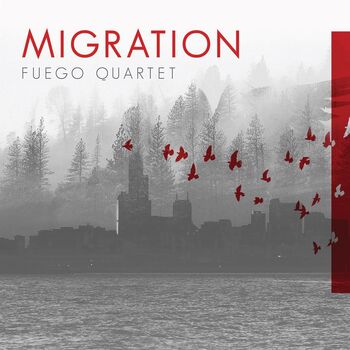FUEGO Saxophone Quartet: The Making of a Fiery Chamber Ensemble
Date Posted: March 13, 2019

Interview conducted by Solomon Elyaho
Where did you all meet and how did the FUEGO saxophone quartet come to exist?
The classical saxophone world is a relatively small one so we all knew each other through various competitions and conferences for a couple of years leading up to us all starting as new graduate students in the same year at the Eastman School of Music where we really started to get to know each other. We all started as new graduate students at the Eastman School of Music in the fall of 2015. The professor of saxophone there, Chien-Kwan Lin, sent us all an email during the summer before the school year asking if we would be interested in forming a graduate chamber music group during our time there since chamber music is a large part of the saxophone curriculum.
Did playing in the Eastman Saxophone Project have anything to do with the decision to start this group?
It did not have any direct correlation with the formation of this group, but it did play a big role in our development during our first couple years, while we were students at Eastman. We discovered a lot of our group philosophy about chamber through playing in ESP, particularly with respect to the importance we place on balance, blend of color, and intonation. It also influenced our choice to memorize a lot of our music, we really enjoyed the sense of connection we got with the other members of the group in ESP and decided to continue that in Fuego. Finally, we all primarily performed on our quartet horns in ESP, which was a tremendous help in getting us familiar with horns that we hadn’t necessarily played in quartet before.
What was your first performance together?
Our first performance was at the Strong National Museum of Play for an audience where the average age was probably about 5 years old. We had so much fun getting to play for such a unique audience and it actually convinced us to spend our entire first year as a group together doing primarily community concerts at similar venues like churches and public libraries.
What are some challenges the group has faced and how have you overcome them?
During our first couple of years together, we had to overcome a variety of different chamber music experiences and ideas about music-making in general in order to come up with one group philosophy. The best advice we got during that time was to “leave your egos at the door” and by doing that we were able to work in a very constructive and healthy way with each other as we found our identity as a group. A more recent challenge we’ve had to overcome is how to handle rehearsing and management of the group when we are now spread out all over the country. We’ve had to change our approach to rehearsal where everyone comes to each rehearsal with their part completely prepared and the score studied since we only have a limited amount of time to rehearse every few months. We also have had to divide up roles in our extra-musical work such as managing finances, planning tours, or running our social media so that everything gets done on time. We have a lot of meetings via Skype in order to make sure that we all stay on the same page as we plan new projects and activities.
"Leave your egos at the door." - Fuego Saxophone Quartet
Tell us about the competitions that you have won as a quartet, any special memories?
During our first year together, we only did a couple of competitions and didn’t do particularly well, which was a great learning experience for us. We consider ourselves very lucky during our second year to have won first prize at the Plowman International Chamber Music Competition, but the part we remember most about that trip was having an ESP dress rehearsal for a concert the day after the final round, so we had to pack up immediately after the awards ceremony and drive back in shifts overnight to Rochester, NY from Missouri in order to be in rehearsal the next morning. We also won the Gold Medal in the Winds, Brass, and Percussion division of the Fischoff Chamber Music Competition, and we have very special memories of trying to get ready for the grand prize performance, while the whole time our family members were trying to call us and Gabe, our bari player, was having a particularly emotional reaction to the news all while trying to get ready to play on live television.
How did you prepare for these competitions?
As previously mentioned, we did a very small number of competitions during our first year, when we spent most of our time really getting used to each other as a chamber music group. Our work that year laid the foundation for our second year where did a lot of competitions and we knew from the beginning of the school year that we were going to be applying for a bunch of them. We picked out a program of music at the beginning of the year where we would have the ability to overlap repertoire between a lot of the different competitions and there was a lot of variety of style between the pieces. We spent the whole year with that program going through constant refinement and also memorizing all of the music, which really helped us find deeper meaning in every piece.
How do you choose your repertoire?
When picking music now, we tend to program for a whole academic year at a time and when we do that we have everyone bring some favorites to a meeting and then we talk about what pieces appeal to everyone. We work really hard to craft a program that has a lot of variety and flexibility, since we oftentimes will perform the same program for a variety of different venues and audiences and we want at least one piece in every program that any audience member can appreciate. A new part of our programming over the past couple of years has also been including pieces that we have been a part of commissioning, which is a very exciting process.
You play music by living composers, why did the group go in this direction?
We don’t solely play music by living composers, but it does make up a big part of our repertoire. Part of this is out of necessity, since the saxophone is such a young instrument in comparison to other instruments. As saxophonists we are participating in a really exciting time where a lot of music is getting written for the instrument so we are proud to be a participant in that movement. We also particularly enjoy the collaboration in a composer-performer relationship and value getting to workshop new works for saxophone quartet with composers who sometimes are writing for the instrument for the first time. We learn a lot about our own potential as performers and artists from composers who ask us to try and explore new sounds that we didn’t know we could create.
What is next for Fuego?
We are in the final stages of production on our debut recording entitled Migration to be released through PARMA Recordings on Ravello Records. We recorded the album back in August at the University of Georgia and it includes David Maslanka’s Recitation Book, William Albright’s Fantasy Etudes, and a piece written for us by Chicago-based composer David Clay Mettens entitled Ornithology S. The album is going to release on April 12, 2019! We also are in the process of becoming a non-profit 501 (c)(3) organization, which is a big undertaking, but one we are very excited about.
Do you have any advice for others that want to start a saxophone quartet?
The biggest advice we would have is to make sure you are or become good friends with your saxophone quartet or other chamber music group. We treat Fuego almost like a second family and we really prioritize getting along and treating each other with respect at all times. It’s also important to find a healthy balance between all of the different elements that go into a music career such as solo performing and teaching, with the commitment to chamber music. That was something that took each of us a while to figure out.
What is each of your Vandoren set ups?
Nicki: S27 mouthpiece, the Klassik ligature, and Blue Box 4s
Erik: A20 mouthpiece, the M|O ligature, and V12 3s
Harrison: T20 mouthpiece, the M|O ligature, and Blue Box 3.5s
Gabe: BL5 mouthpiece, the Optimum ligature, and Blue Box 3s
Subscribe to the We Are Vandoren E-newsletter (WAVE) to receive 4 weekly articles for Performers, Students, and Educators
